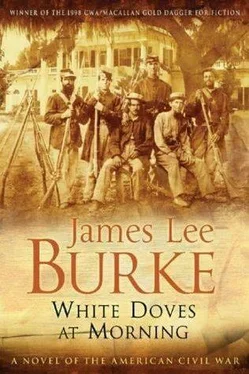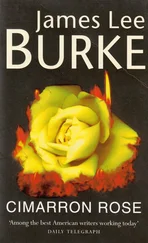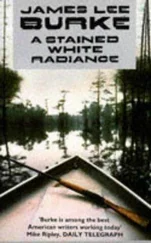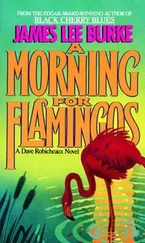Flower stepped out on the gallery, into the hot wind blowing from the south. Ira Jamison got down from his carriage and removed his hat and wiped the inside of the band with a handkerchief as he nodded approvingly at the house and the mixture of flowers and banana trees and palms planted around it.
He wore a white shirt with puffed sleeves and a silver vest and dark pants, but because of the heat his coat was folded neatly on the cushions of the carriage. He carried an ebony-black cane with a gold head on it, but Flower noticed his limp was gone and his skin was pink and his eyes bright.
"This is extraordinary. You've done a wonderful job with the old place," he said. "My heavens, you never cease proving you're one of the most ingenious women I've ever known."
She looked at him mutely, her face tingling.
"Aren't you going to say hello?" he asked.
"How do you do, Colonel?" she said.
"Smashing, as my British friends in the cotton trade say. I'm in town to check on a few business matters. Looks like the Yanks burned down my laundry and the cabins out back with it."
"I'm glad you brought that up. My fifty arpents runs into seventy-five of yours. I'll take them off your hands," she said.
"You'll take them off-" he began, then burst out laughing. "Now, how would you do that?"
"Use my house and land to borrow the money. I already talked to the bank."
"Will you pay me for the buildings I lost?"
"No."
"By God, you amaze me, Flower. I'm proud of you," he said.
She felt her heart quicken, and was ashamed at how easily he could manipulate her emotions. She walked down the steps, then tilted up the flowerpot she had stuck the racist newspaper under.
"Read this and the note that came with it," she said.
Jamison set down his cane on the steps and unfolded the newspaper in the shade. Behind him, the outrider, whom Flower recognized as Clay Hatcher, stood in the sun, sweating under his hat. His bottom lip was swollen and crusted with black blood along a deep cut. He kept swiping horseflies out of his face.
Jamison tore the note in half and stuck it inside the newspaper and dropped the newspaper on the step.
"No one will dare harm you, Flower. I give you my word," he said.
"They already did. Three men raped me. They were paid by Rufus Atkins."
"I don't believe that. Rufus has worked for me thirty years. He does-"
"He does what you tell him?" she said.
His faced seemed to dilate and redden with his frustration. "In a word, yes," he said.
"He made me go to bed with him, Colonel. Miss Abby told you about it. But you didn't raise a hand."
"I set the example. So you're correct, Flower. The guilt is mine."
He was speaking too fast now, his mercurial nature impossible to connect from one moment to the next.
"Suh, I don't understand," she said.
"Years ago I visited the quarters at night. I took all the privileges of a wealthy young plantation owner. People like Rufus and our man Clay over there are products of my own class."
"You helped them hurt me, suh."
"People can change. I'm sorry, Flower. My God, I'm your father. Can't you have some forgiveness?" he said.
After he was gone she sat on the top step of her gallery, her temples pounding, a solitary crow cawing against the yellow haze that filled the afternoon. She could not comprehend what had just happened. He had looked upon her work, her creations, her life, with admiration and pride, then had accepted paternity for her and in the same sentence had asked forgiveness.
Why now?
Because legally he can't own you anymore. This way he can, a voice answered.
She wanted to shove her fingers in her ears.
WILLIE saw reprinted copies of the article from the racist newspaper tacked on trees and storefronts all over town. One was even placed in his mailbox by a mounted man who leaned down briefly in the saddle, then rode away in the early morning mist. Willie had run after him, but the mounted man paid him no heed and did not look back at him. Night riders had come into his yard twice now, calling his name, tossing rocks at his windows. So far he had not taken their visits seriously. He had learned the White League and the Knights of the White Camellia, when in earnest, struck without warning and left no doubt about their intentions. A carpetbagger was stripped naked and rope-drug through a woods, a black soldier garrotted on the St. Martinville Road, a political meeting in the tiny settlement of Loreauville literally shot to pieces.
But what do you do when the names of your friends are smeared by a collection of nameless cowards? he asked himself.
Make your own statement, he answered.
He saddled a horse in the livery he had inherited from his mother and rode out to the ends of both East and West Main, then divided the town into quadrants and traversed every street and alley in it, pulling down copies of the defamatory article and stuffing them in a choke sack tied to his pommel. By early afternoon, under a white sun, he was out in the parish, ripping the article from fence posts and the trunks of live oaks that bordered cane fields and dirt roads. His choke sack bulged as though it were stuffed with pine cones.
South of town, in an undrained area where a group of Ira Jamison's rental convicts were building a board road to a salt mine, Willie looked over his shoulder and saw a lone rider on a buckskin gelding behind him, a man with a poached, wind-burned face wearing a sweat-ringed hat and the flared boots of a cavalryman.
Willie passed a black man cooking food under a pavilion fashioned from tent poles and canvas. The black man was barefoot and had a shaved, peaked head, like the polished top of a cypress knee. He wore a white jumper and a pair of striped prison pants and rusted leg irons that caused him to take clinking, abbreviated steps from one pot to the next.
"You one of Colonel Jamison's convicts?" Willie asked.
"You got it, boss," the black man replied.
"What are you selling?"
"Greens, stew meat and tomatoes, red beans, rice and gravy, fresh bread. A plateful for fifteen cents. Or it's free if you wants to build the bo'rd road under the gun," the black man said. He roared at his own joke.
Willie turned his horse in a circle and waited in the shade of a live oak for the rider to approach him. The rider's eyes seemed lidless and reminded Willie of smoke on a wintry day or perhaps a gray sky flecked with scavenger birds. In spite of the heat, the rider's shirt was buttoned at the wrists and throat and he wore leather cuffs pulled up on his forearms.
"You wouldn't bird-dog a fellow, would you, Captain Jarrette?" Willie said.
"I make it my business to check out them that need watching," the rider replied.
"You put your sword to me when I was unarmed and had done you no injury. But you also saved me from going before a Yankee firing squad. So maybe we're even," Willie said.
"Meaning?"
"I'd like to buy you a lunch."
Jarrette removed his hat and surveyed the countryside, his hair falling over his ears. He leaned in the saddle and blew his nose with his fingers.
"I ain't got nothing against hit," he said.
Jarrette waited in the shade while Willie paid for their lunches. He watched the convicts lay split logs in the saw grass and humus and the black mud that oozed over their ankles. His nose was beaked, his chin cut with a cleft, his eyes connecting images with thoughts that probably no one would ever be privy to. Jarrette did not sit but squatted while he ate, shoveling food into his mouth as fast as possible with a wood spoon, scraping the tin in the plate, wiping it clean with bread, then eating the bread and licking his fingers, the muscles in his calves and thighs knotted into rocks.
"This grub tastes like dog turds," he said, tossing his bare plate on the grass.
Читать дальше












